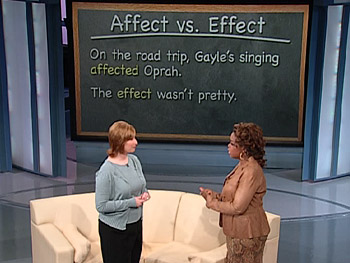 One of my biggest pet peeves when it comes to the English language is writers misusing words in their work, by using the wrong homophone in a sentence. There are dozens of these homophonic pairs, and writers are often confused as to which one should be used in any given context. A cheating husband, for instance, is not having a “discrete affair;” he is (hopefully) having a discreet one. “Its” and “it’s” are constantly interchanged even in street signs and publicly displayed ads, and let’s not even get started on the confusion among “their,” “there,” and “they’re.” But of all these examples, the one that I find the most irritating is the mix-up between “affect” and “effect”.
One of my biggest pet peeves when it comes to the English language is writers misusing words in their work, by using the wrong homophone in a sentence. There are dozens of these homophonic pairs, and writers are often confused as to which one should be used in any given context. A cheating husband, for instance, is not having a “discrete affair;” he is (hopefully) having a discreet one. “Its” and “it’s” are constantly interchanged even in street signs and publicly displayed ads, and let’s not even get started on the confusion among “their,” “there,” and “they’re.” But of all these examples, the one that I find the most irritating is the mix-up between “affect” and “effect”.Though there is only a one-letter difference between these two homophones, there are huge differences in what they mean, and in what context each belongs. Affect and effect are completely different parts of speech: Affect is generally a verb, while effect is nearly always a noun. The word “affect” means “to have an effect on,” or “to influence.” Meanwhile, “effect” is a word which means “a result.” In examples:
The humidity affected my hair by making it frizzier.
The humidity had a frizzing effect on my hair.
This is fairly easy to keep straight; it seems the main reason people make mistakes when using them is because they are unsure whether the noun starts with an A or an E. Grammar Girl has a simple mnemonic for this, as illustrated in the cartoon below.
As we can see, “arrow,” “aardvark,” and “affect” all start with an A, while “eye-popping” and “effect” start with an E. In most cases, this will help keep affect and effect straight in writers’ minds.
However, there are a few rare instances in which “affect” is used as a noun, and “effect” becomes a verb.
- Affect is a noun generally in the context of a psychological study, where a psychologist will note that a patient is displaying a certain behavior. An example: The patient was displaying a depressed affect. According to Grammar Girl, psychologists like to use this word to describe their patients’ emotions because it is impossible to tell what someone is really feeling; psychologists can only see how they appear to feel.
- When used as a verb, effect means “to bring about,” or “to accomplish.” Example: Obama hopes to effect change in America.
However, these are quite rare exceptions that are only really relevant for maybe five percent of the times either word is used. For the most part, affect should be used as a verb, and effect should be a noun. With practice, and the help of the mnemonic, it should be easy for writers to finally get the difference between them down.
Source:
Grammar Girl




I was so glad to see that someone covered this because the rule over affect vs. effect is something I still struggle with. You gave a very clear and detailed explanation---it helped a lot!
ReplyDelete